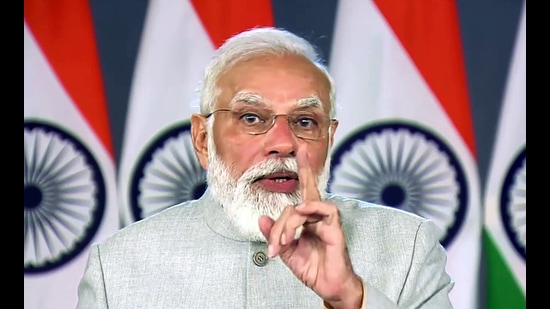Pharma policy push will help india become a leader in medical sector, says PM
PM Modi said, the industry needs to focus on two key areas – the requirements for raw materials and addressing the increasing global demand for traditional medicines.
The government’s policy interventions in the pharmaceutical sector envisions creating an ecosystem for innovation so that India can become a leader in discovery of drugs and medical technology, said Prime Minister Narendra Modi on Thursday.

In his inaugural address at the Global Innovation Summit 2021, the PM said, “Our policy interventions are based on wide consultation with all stakeholders. We are sensitive towards the industry demands on regulatory framework and are actively working in this direction. The industry has got a major boost through the performance liked incentive schemes worth over 30,000 crores for pharmaceuticals and medical devices. The support of industry, academic world, and especially our talented youth is important. That is why we are encouraging collaboration.”
He said, the industry needs to focus on two key areas – the requirements for raw materials and addressing the increasing global demand for traditional medicines.
He added, “I also wish to highlight two areas which I want you to explore carefully. The first one relates to raw material requirements. When we were fighting Covid-19, we found that this was one issue that needs much more attention. We must think about ramping up domestic manufacturing of key ingredients for vaccines and medicines. The second area, relates to India’s traditional medicines. There is now significant and growing demand of these products in the international markets. Can we think of more ways to popularise our traditional medicines in the line with global requirement, scientific standards and best manufacturing practices?”
The union health and chemical and fertiliser minister Mansukh Mandaviya said, “Our research policy in health is also in its advanced stages which will provide the right platform for innovation. The pandemic taught lessons and drug security is one of them. The PMs health policy envisions not only taking consideration of India but the whole world. When any countries invest in India the drug quality is as good as manufacturing in their country.”
He urged “the world” to join the journey of discover in India, make in India, and invest in India. He said, with innovation he was confident that India could achieve the ambitious target of the pharmaceutical industry growing to 130 billion USD by 2030.
The policy thrust has to be in strengthening regulatory framework, incentivising investment for innovation, and creating a collaborative ecosystem of industry, academia, and startups, said experts at the summit.
NITI Aayog member Dr VK Paul said that the organisation was working on a system of research liked incentive that will incentivise risk taking for discovery and translation of drugs, vaccines, and biologics.
“We have to be willing to take risks; we have been too cosy. Our previous journey met the objectives of the time, but the future is bleak if we do not turn in the right direction. We are looking at how the government partnership can aid risk-taking; the failure rate for drug or biologics development is 98% and that level should be accepted as success,” he said.
He added that there was a need to create trust between industry and clinicians and transparent funding mechanisms so that there is no conflict of interest. “When you talk of a cardiologist who helped in the trial of a medicine, there is a conflict of interest. We have to develop a transparent funding mechanism and strengthen the pathways so that there are better trials,” he said.
He criticised the small-scale trials for several drugs during the pandemic and said that without a proper well-designed large-scale trial the efforts were a waste. In contrast, he appreciated the large scale well designed clinical trials conducted by the vaccine manufacturers.
He also added that practitioners of AYUSH should be trained in conducting equally well designed trials so that there is a greater acceptability of the products.
Principal Scientific Advisor Prof. K VijayRaghavan stressed on integration of information technology in chemistry and biology that can help in speeding up search for novel and repourposed molecules. He also stressed on the need to smoothen out the regulatory framework without compromising on safety and risk mitigation through industry-academia participation.
Secretary of department of pharmaceutical S Aparna said that the draft discussion paper on policy to promote innovation in the sector released in October focuses on regulatory framework having a bias towards innovations, creating transparency and timeliness in regulatory processes, and strengthening the regulatory body as well as the pricing authority to deal with new and innovative drugs and technology without creating hurdles.






